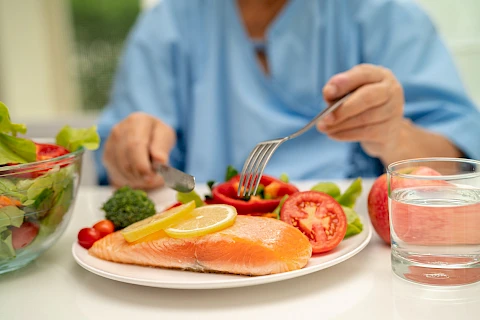
Eye health is incredibly important as vision issues can impact independence and quality of life. As a caregiver, one of the best ways you can support senior eye health is through good nutrition. Senior Helpers Buffalo will explore how certain vitamins and minerals can support eye function. We'll also provide a list of eye-healthy foods and share some tips for incorporating them into a senior's diet.
Essential Vitamins and Minerals for Senior Eye Health
Vitamins and minerals play a prime role in maintaining senior eye health. Vitamin A, often found in colorful vegetables such as carrots and sweet potatoes, helps maintain a clear cornea and is vital for night vision. Seniors should aim for a daily intake of about 700-900 micrograms.
Vitamin C, found in citrus fruits such as oranges and grapefruits, can prevent cataracts and slow the progression of age-related macular degeneration (AMD). It's an antioxidant that helps protect the eyes from harmful free radicals. Seniors need about 75-90 milligrams of this vitamin daily.
Zinc, found in nuts, seeds, and meat, is important for retina health and can help delay AMD. It aids in transporting Vitamin A from the liver to the retina. The recommended daily amount of Zinc is 8-11 milligrams.
Foods for Senior Eye Health
Eating a balanced diet rich in these vitamins and minerals can make a huge difference in senior eye health. Leafy greens like spinach and kale are rich in Vitamins A and C as well as other antioxidants. These help protect the eyes from harmful light and free radicals. They are also versatile and can be easily added to salads, soups, or smoothies.
Fish like salmon and mackerel are high in omega-3 fatty acids, which are essential for eye health as they can help prevent dry eyes and AMD. Incorporating fish into meals a couple of times a week can be beneficial.
Citrus fruits like oranges and grapefruits are packed with Vitamin C. They not only support the immune system but also help maintain eye health. These fruits can be eaten as snacks or added to seniors' salads and desserts.
Incorporating Eye-Healthy Foods Into a Senior's Diet
Meal planning can make it easier to ensure that a senior gets the nutrients they need for optimal eye health. Aim for a balanced diet that includes a variety of vegetables, fruits, lean proteins, and whole grains. Caregivers can also create meal plans that incorporate several eye-healthy foods. For example, this can include a spinach and salmon salad for lunch or a sweet potato and carrot soup for dinner.
However, seniors may have dietary restrictions or food allergies. So it is important to look for substitutes in such cases. For instance, if they can't have fish, try flaxseeds or walnuts for omega-3s. Remember to always consult with healthcare providers to find the best alternatives.
Senior Helpers Provides Custom Senior Care Services
Maintaining senior eye health through diet is important for our loved ones. Key vitamins and minerals such as Vitamin A, Vitamin C, and Zinc can make a significant difference. By incorporating eye-healthy foods into seniors' meals, caregivers can help them maintain good vision and overall health.
As caregivers, your role in supporting senior nutrition is important. Prioritize eye health by ensuring seniors' diets are rich in these essential nutrients. For personalized senior care services in Buffalo, Depew, Lancaster, Getzville, and Bowmansville, contact us at Senior Helpers Buffalo. Let's work together to promote better eye health for our seniors.